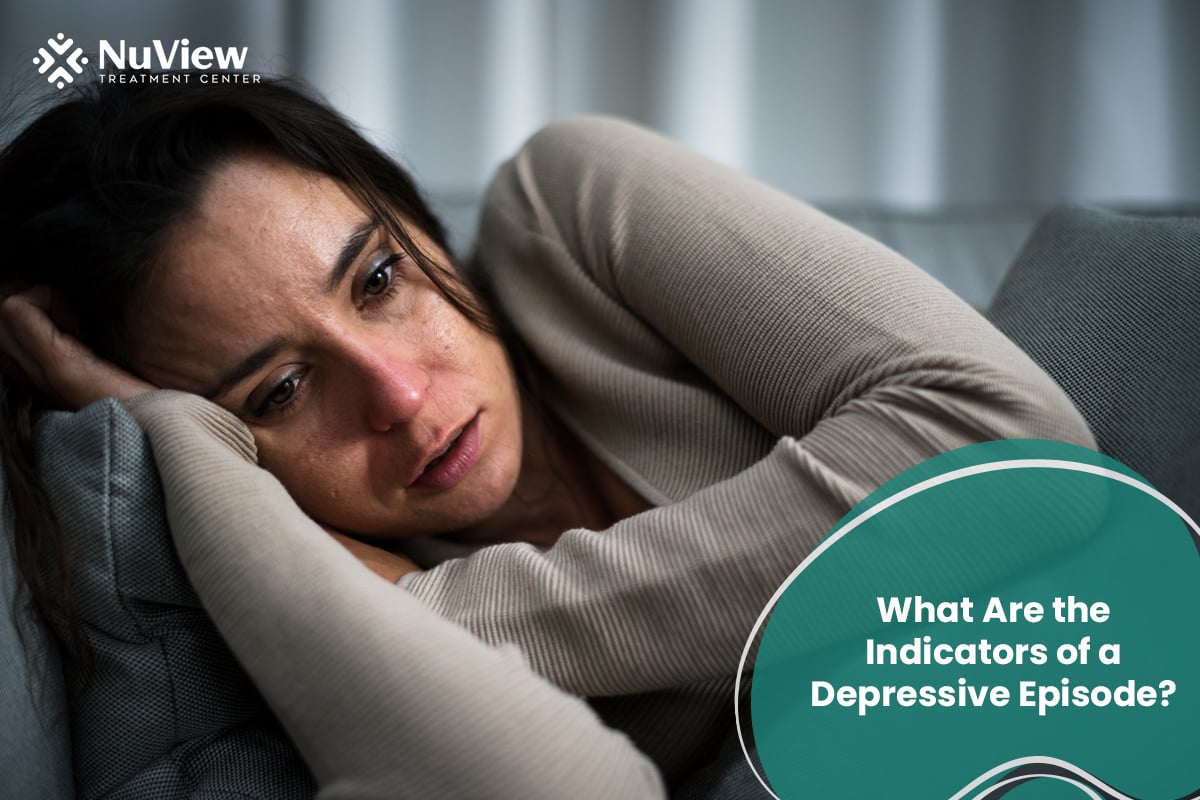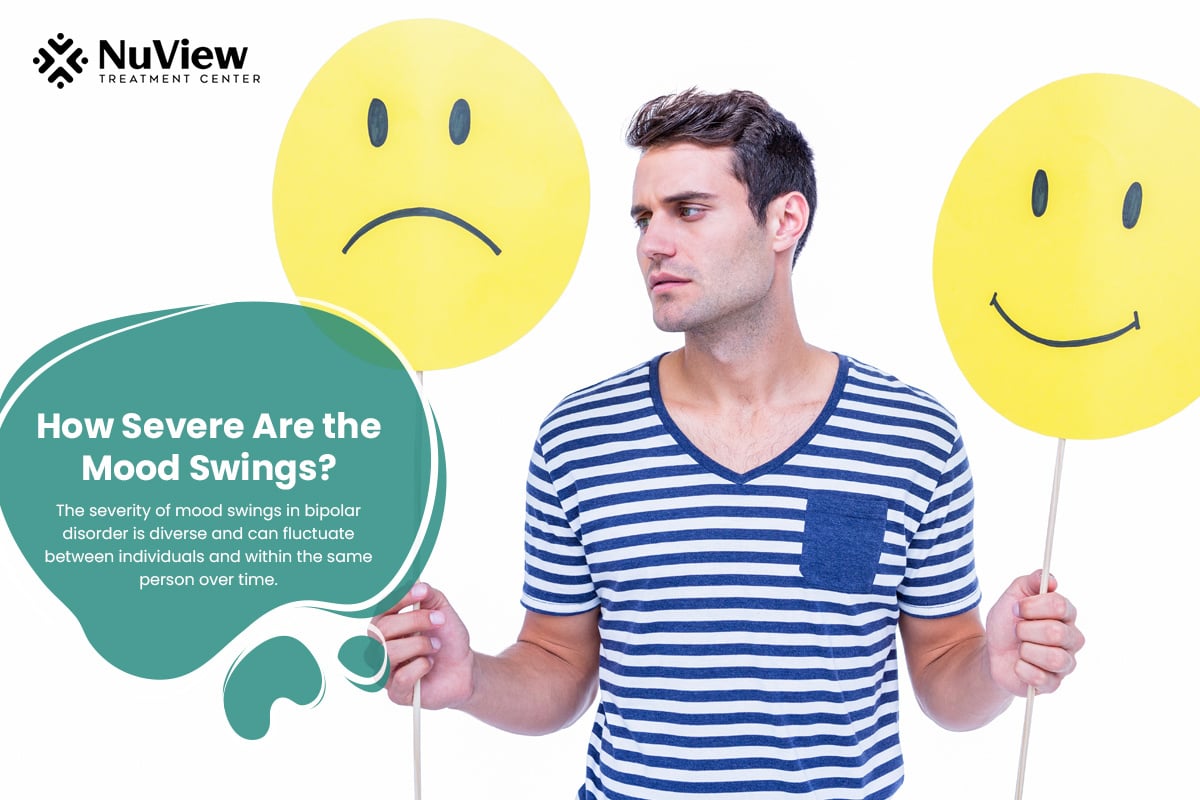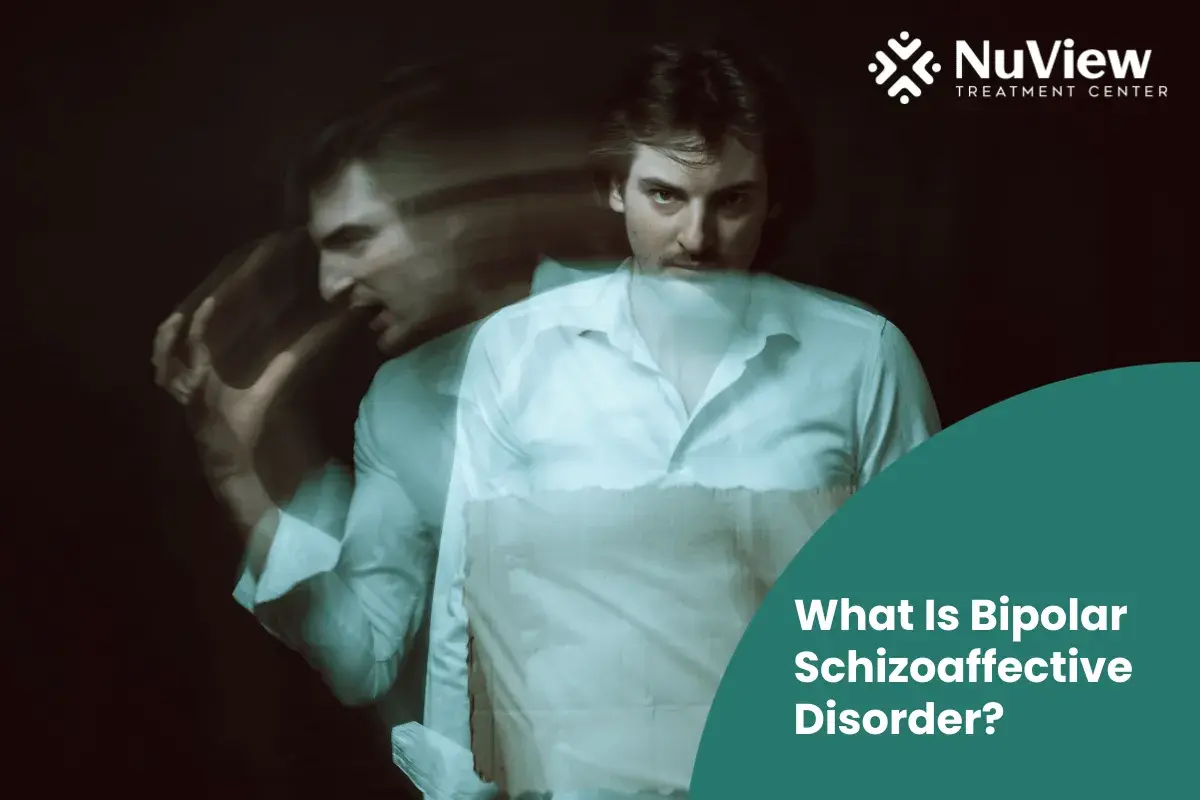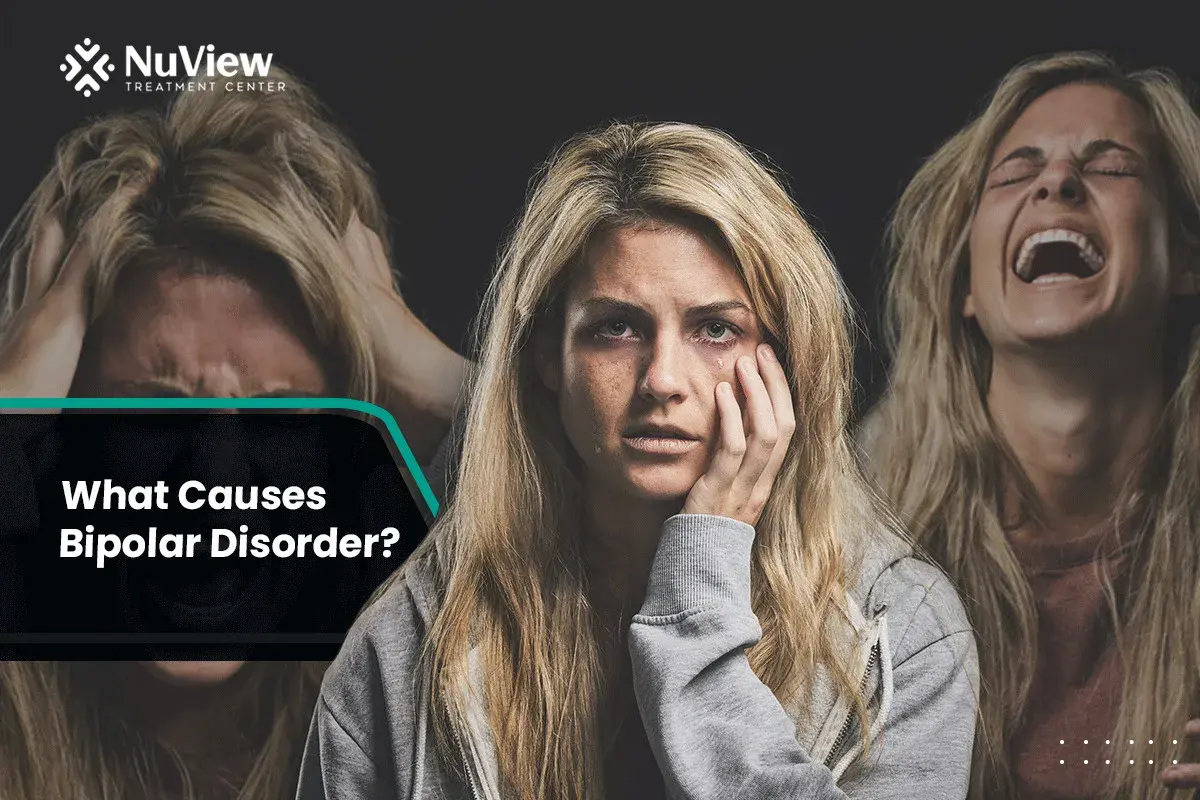Bipolar disorder can significantly impact a person's daily life. It's crucial to comprehend the complexities of this mental health condition, which affects a significant portion of the population.
The age at onset for bipolar depression is typically earlier, with first symptoms often appearing between the ages of 13 and 18 years.
Bipolar disorder frequently receives incorrect initial diagnoses. According to a survey conducted by the National Depressive and Manic-Depressive Association (DMDA), 69 percent of people with bipolar disorder are initially misdiagnosed, and over 30% of them continue to be misdiagnosed for a decade or longer.
To obtain an accurate diagnosis, paying attention to the bipolar disorder symptoms and observing any triggers that may prompt these mood fluctuations is crucial.
What Are the Common Signs and Symptoms of Bipolar Disorder?
Bipolar disorder is a complex condition known for its diverse symptoms, primarily characterized by extreme mood swings. These mood swings significantly affect an individual's emotional state and ability to lead a stable daily life. Bipolar disorder encompasses a range of symptoms, but among the many aspects to consider, two key elements to watch are mixed episodes and cycling moods.
Mixed episodes can be incredibly challenging for those living with bipolar disorder. In these episodes, individuals experience a complex blend of characteristics from both manic and depressive states.
This unique combination can lead to intense irritability, racing thoughts, and despair, all co-occurring. It's like an emotional rollercoaster that can be incredibly disorienting and distressing for those affected.
Bipolar disorder is also often characterized by cycling moods. These mood cycles follow distinct patterns, with individuals experiencing shifts between different emotional states. These cycles may involve heightened mania or hypomania, during which a person feels excessively energetic, joyful, and sometimes irritable.
These high-energy phases can be followed by depressive episodes, during which the individual feels extremely sad and exhausted and may lose interest in previously enjoyed activities. Recognizing these patterns is essential, as it aids in diagnosis and managing the condition effectively.
What Does a Manic Episode Feel Like?
Manic episodes are a defining characteristic of bipolar disorder. During a manic episode, individuals often describe feeling an intense, elevated mood, sometimes to the point of euphoria. They may experience a heightened sense of self-confidence, racing thoughts, and increased creativity, which can lead to a burst of productivity and innovative thinking.
However, this phase can also be marked by impulsivity, leading to risky behaviors like excessive spending, substance abuse, or engaging in dangerous activities. People in a manic state might feel like they can conquer the world. Yet, their behavior can often be tense and harmful, potentially resulting in adverse consequences for themselves and those around them.
What Are the Indicators of a Depressive Episode?

Depressive episodes in bipolar disorder can be emotionally draining and challenging to endure. During these times, individuals often experience persistent and overwhelming sadness that can invade every aspect of their lives. This deep-seated sadness is often accompanied by hopelessness, making it difficult to see any positive aspects of life.
A profound lack of energy is a characteristic of depressive episodes. People may feel mentally and physically drained, exhausting even the simplest tasks. This energy depletion can lead to losing interest in activities they once enjoyed, creating a sense of emptiness.
The cognitive aspects of depressive episodes can be equally distressing. Many individuals with bipolar disorder experience trouble concentrating and making decisions during these periods. The world may feel like a foggy and overwhelming place.
Unfortunately, the emotional burden of depressive episodes can escalate to the point where individuals contemplate self-harm or suicide. These intrusive thoughts are severe indicators that professional help is urgently needed.
Sleep disturbances are common in depressive episodes. This may manifest as difficulty falling asleep, staying asleep, or oversleeping. Changes in appetite, often leading to weight loss or gain, are typical symptoms during these phases.
What Triggers Could Indicate the Onset of Bipolar Episodes?
Bipolar disorder is often influenced by various triggers that can initiate episodes. These triggers can be categorized into different types, including external factors like stressful life events and physiological changes within the body.
Can Stress or Life Events Trigger Episodes?
Yes, stress and significant life events can indeed trigger bipolar episodes. The link between external stressors and the onset of bipolar episodes is well-documented. High stress levels and life-changing events like losing a loved one, significant transitions, or traumatic experiences can disrupt a person's emotional balance and trigger mood swings.
Individuals with bipolar disorder must recognize the potential impact of stress and life events on their mental health. Developing effective coping strategies, seeking support, and working closely with healthcare professionals can help manage these triggers and reduce the frequency and severity of bipolar episodes.
Are There Any Physiological Triggers?
Physiological triggers for bipolar disorder encompass a range of internal factors that can influence the condition. Some common physiological triggers include:
Sleep Disturbances:
Irregular sleep patterns, including insomnia or hypersomnia, can exacerbate bipolar symptoms. Sleep is crucial in regulating mood; disturbances can trigger depressive and manic episodes.
Substance Abuse:
Developing bipolar disorder often involves the misuse of substances like alcohol, drugs, or even excessive caffeine can significantly impact bipolar disorder. Substances can disrupt mood stability and increase the frequency of episodes.
Circadian Rhythm Disruptions:
Disturbances in the body's internal clock, known as the circadian rhythm, have been linked to bipolar disorder. Changes in routine or irregular sleep-wake cycles can contribute to mood swings.
Hormonal Changes:
Hormonal fluctuations, particularly in women, can be associated with mood disturbances. For some individuals, hormonal changes during the menstrual cycle or menopause may serve as triggers.
Stress and significant life events can indeed serve as triggers for bipolar episodes. High stress levels, such as work-related pressures or relationship difficulties, can exacerbate mood swings.
Get Started With Nuview Treatment Center
Our dedicated professional staff is here to guide you or your loved one on the journey to lasting recovery, offering support every step of the way.
How Do Symptoms of Bipolar Disorder Differ from Typical Mood Fluctuations?
Bipolar disorder can be challenging to differentiate from typical mood fluctuations, especially regarding everyday ups and downs. However, when these mood swings become notably prolonged, such as severe depression or abnormal elation lasting at least four days, it might indicate bipolar disorder.
The key differentiator lies in the intensity and impact of these mood shifts. Individuals with bipolar disorder often experience more intense and disruptive mood swings than those without the condition.
For instance, people without mood disorders might experience occasional frustration when they receive constructive criticism at work. While it's natural to feel a bit down temporarily, they generally handle it by reflecting on the feedback and improving their performance.
In contrast, individuals with bipolar disorder might react more intensely. They could become profoundly discouraged, unable to accept criticism, and may even respond with anger or complete disregard for their job, potentially leading to severe consequences.
Furthermore, during moments of depressed mood, individuals without mood disorders typically can still carry out their daily tasks and responsibilities. However, individuals with bipolar disorder may feel so profoundly depressed that they struggle with even basic activities.
It's common for them to remain in bed for extended periods or neglect personal hygiene. They may also frequently struggle with thoughts of suicide, making their condition considerably more severe.
How Long Do Bipolar Episodes Last?
The duration of bipolar episodes can vary significantly, depending on the type of episode an individual is experiencing. Here's a general overview of the duration of different bipolar episodes:
Manic Episodes: Manic episodes typically last for at least one week. In some cases, they may persist for a few weeks. During this time, individuals experience an elevated mood, increased energy, impulsivity, and decreased need for sleep.
Hypomanic Episodes: Hypomanic episodes are similar to manic episodes but less severe. They last at least four consecutive days and are often more challenging to identify.
Major Depressive Episodes: Depressive episodes in bipolar disorder are characterized by intense sadness, low energy, and loss of interest in previously enjoyed activities. They can last for a minimum of two weeks and can extend for several months.
Mixed Episodes: Mixed episodes involve both manic and depressive symptoms simultaneously. These episodes are typically shorter, usually lasting a week or less.
Rapid Cycling: Some individuals with bipolar disorder experience rapid cycling, which means they have four or more mood episodes within 12 months. These episodes can be brief, lasting only a few days.
The duration and frequency of episodes can vary from person to person, and treatment can play a crucial role in managing and potentially reducing the length of these episodes.
How Severe Are the Mood Swings?

The severity of mood swings in bipolar disorder is diverse and can fluctuate between individuals and within the same person over time. Manic episodes, characterized by an extreme surge in mood and energy, are often severe and can lead to impulsive and risky behaviors, sometimes requiring hospitalization.
On the other hand, hypomanic episodes are similar but less intense, allowing individuals to manage daily tasks and even feel more productive.
Depressive episodes are marked by profound sadness, hopelessness, and a disinterest in activities. These episodes can be severe, leading to difficulties in functioning and, in some cases, the emergence of self-harming or suicidal thoughts.
Mixed episodes, which combine symptoms of manic depression, are associated with high irritability and impulsivity. Their severity can vary but generally pose challenges in daily life.
Get Started With Nuview Treatment Center
What Should Be the Next Steps If I Suspect I Have Bipolar Disorder?
If you suspect you may have bipolar disorder or are experiencing symptoms that resemble this condition, taking the proper steps is crucial for an accurate diagnosis and effective treatment. Let's delve into the steps taken after suspecting you have bipolar disorder.
Should I Consult a Mental Health Professional?

Seeking a mental health professional's guidance is vital if you suspect you have bipolar disorder. Bipolar disorder is a complex condition that requires a bipolar test involving thorough evaluation, and mental health professionals, such as psychiatrists or clinical psychologists, are well-equipped to provide this assessment.
Furthermore, consulting a mental health professional is crucial because a precise diagnosis is the foundation for effective treatment. They can develop a tailored treatment plan based on the types of bipolar disorder, be it bipolar I, bipolar II disorder, or cyclothymic disorder. This plan may include therapy, medication, lifestyle adjustments, and ongoing support.
What Kinds of Tests and Assessments Can I Expect?
When you consult a mental health professional for a suspected bipolar disorder, you can expect a bipolar disorder test, including a series of assessments to aid in the diagnostic process. These evaluations are crucial to determine whether you have bipolar disorder and, if so, which type. Here are some standard tests and assessments you might encounter:
Clinical Interviews: Your mental health professional will conduct detailed clinical interviews to gather information about your symptoms, medical history, family history, and daily functioning. This helps them understand your emotional and psychological experiences.
Mood Charts: Keeping a mood chart is often recommended. This involves tracking your daily mood fluctuations, sleep patterns, energy levels, and unusual behaviors. Mood charts can provide valuable insights into your condition.
Psychological Assessments: Standardized psychological tests and questionnaires can be administered to assess your mood, thoughts, and behaviors. These tests can help gauge the severity of your symptoms.
Medical Examination: It's essential to rule out any underlying medical conditions contributing to your symptoms. A medical examination, including blood tests, can identify or rule out physical factors.
Mental Health History: You may be asked about your past and present mental health, including any previous diagnoses or treatments. This helps in understanding your mental health journey.
Observation: Your mental health professional will observe your behavior, thought patterns, and emotional responses during your sessions, which provides valuable information for diagnosis.
Collateral Information: Sometimes, information from family members or close friends may be sought to gain a more comprehensive picture of your behavior and symptoms.
Diagnostic Criteria: Your mental health professional will refer to established diagnostic criteria, such as the DSM-5 (Diagnostic and Statistical Manual of Mental Disorders, Fifth Edition), to assess if your symptoms align with bipolar disorder.
Can Online Quizzes and Self-Assessments Accurately Diagnose Bipolar Disorder?
Online quizzes and self-assessments, such as a mood disorder questionnaire, can be a helpful starting point for self-reflection and understanding your mental health. However, they cannot accurately diagnose bipolar disorder. Here's why:
-
Limited Scope: Online quizzes are not comprehensive diagnostic tools for bipolar disorder.
-
Subjective Nature: Self-assessments rely on your descriptions of your symptoms and experiences.
-
Variability in Presentation: Bipolar disorder can manifest differently in each individual.
-
Co-Occurring Conditions: Other mental health conditions can mimic bipolar symptoms.
-
False Reassurance or Alarm: Online quizzes may yield inaccurate results, causing unnecessary alarm or delaying proper diagnosis and treatment.
-
Lack of Clinical Assessment: To diagnose bipolar disorder, a mental health professional needs to conduct in-depth clinical assessments.
What Are the Risks of Not Seeking Professional Help?
The risks of not seeking professional help when you suspect you have bipolar disorder are significant and can profoundly impact your life. Here are some of the key risks:
-
Without professional evaluation, you may not receive a timely and accurate diagnosis. This delay can lead to prolonged suffering and the potential for your condition to worsen over time.
-
Bipolar disorder can significantly disrupt your life. Not seeking help means you may struggle to manage the intense mood swings, which can interfere with your daily activities, relationships, and overall well-being.
-
Untreated bipolar disorder is associated with a higher risk of self-harm and suicide. The depressive episodes can be particularly distressing and dangerous if not addressed by a mental health professional.
-
The unpredictable mood swings and behaviors associated with bipolar disorder can strain relationships with family, friends, and colleagues. Without professional guidance, you may find it challenging to maintain healthy connections.
-
Bipolar symptoms can impact your ability to work or study. Untreated bipolar disorder may lead to difficulties meeting responsibilities, completing a job, or succeeding in school.
-
Some individuals with bipolar disorder tend to use drugs or alcohol to cope with their symptoms. Without professional help, you might be at higher risk for substance abuse and its associated problems.
-
Overall, the absence of professional help can significantly reduce quality of life. The disorder's symptoms can limit your potential, happiness, and life satisfaction.
Exploring the Complexity of Bipolar Disorder with NuView Treatment Center
At NuView Treatment Center, we comprehend the distinct challenges of Bipolar disorder, and we've customized our services to cater to these unique requirements.
Our team is more than just clinically qualified; they are compassionate individuals deeply committed to aiding you in regaining control of your life.
Our all-encompassing approach ensures that you're not merely a case or statistic but a unique individual with aspirations, concerns, ambitions, and obstacles.
If you're considering the next step, contact us today because everyone deserves a life filled with harmonious moments, uninterrupted by the relentless cadence of Bipolar disorder.
- What Are the Common Signs and Symptoms of Bipolar Disorder?
- What Triggers Could Indicate the Onset of Bipolar Episodes?
- How Do Symptoms of Bipolar Disorder Differ from Typical Mood Fluctuations?
- How Long Do Bipolar Episodes Last?
- How Severe Are the Mood Swings?
- What Should Be the Next Steps If I Suspect I Have Bipolar Disorder?
- Can Online Quizzes and Self-Assessments Accurately Diagnose Bipolar Disorder?
- What Are the Risks of Not Seeking Professional Help?
- Exploring the Complexity of Bipolar Disorder with NuView Treatment Center
- What Are the Common Signs and Symptoms of Bipolar Disorder?
- What Triggers Could Indicate the Onset of Bipolar Episodes?
- How Do Symptoms of Bipolar Disorder Differ from Typical Mood Fluctuations?
- How Long Do Bipolar Episodes Last?
- How Severe Are the Mood Swings?
- What Should Be the Next Steps If I Suspect I Have Bipolar Disorder?
- Can Online Quizzes and Self-Assessments Accurately Diagnose Bipolar Disorder?
- What Are the Risks of Not Seeking Professional Help?
- Exploring the Complexity of Bipolar Disorder with NuView Treatment Center
Get Help Today!
Singh, T., & Rajput, M. (2006). Misdiagnosis of bipular disorder. Psychiatry (Edgmont (Pa. : Township)), 3(10), 57–63.
Culpepper L. (2014). The diagnosis and treatment of bipular disorder: decision-making in primary care. The primary care companion for CNS disorders, 16(3), PCC.13r01609. https://doi.org/10.4088/PCC.13r01609
Preuss, U. W., Schaefer, M., Born, C., & Grunze, H. (2021). Bipular Disorder and Comorbid Use of Illicit Substances. Medicina (Kaunas, Lithuania), 57(11), 1256. https://doi.org/10.3390/medicina57111256
Azevedo, J., Martins, M., Castilho, P., Barreto, C., Pereira, A. T., & Macedo, A. (2021). Pertinence and development of cibd – clinical interview for bipular disorder. European Psychiatry, 64(Suppl 1), S619. https://doi.org/10.1192/j.eurpsy.2021.1646
Everyone is Welcome Here and We All Have Your Back
Your healing journey deserves a personalized approach. At NuView, we integrate expertise in behavioral therapy, mental health, and substance use treatment to create a customized recovery plan tailored to your unique needs.
Connect with our Admissions Specialists today.







Written By
Dr. Ryan Peterson